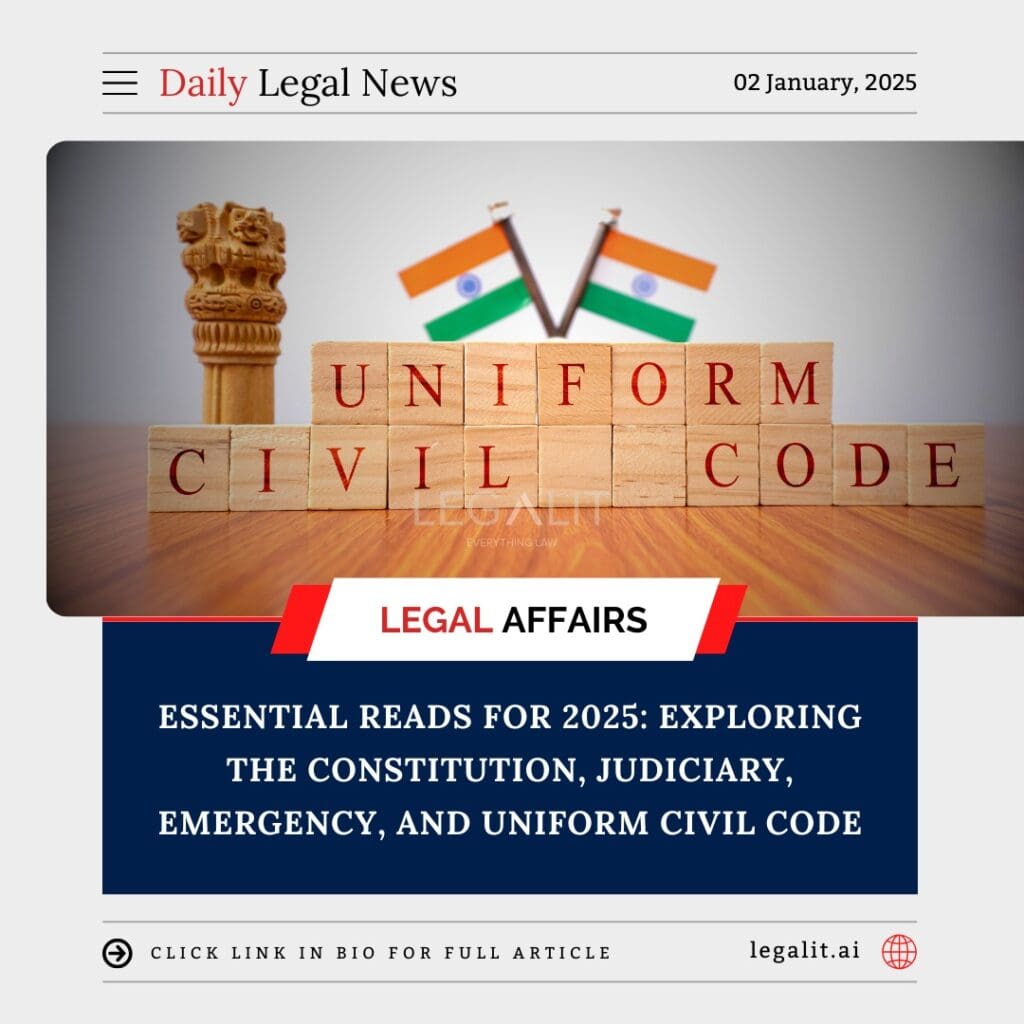
As 2025 unfolds, critical discussions about constitutional law, judicial reforms, historical emergencies, and the Uniform Civil Code (UCC) are poised to dominate India’s legal and socio-political landscape. These subjects not only resonate with ongoing debates but also reflect the trajectory of India’s evolving democracy. Here are the key themes and associated literature to explore for a deeper understanding.
1. The Indian Constitution: Living Document of Democracy
The Constitution of India remains the cornerstone of governance, guaranteeing rights while establishing checks and balances. As new challenges emerge, revisiting the Constitution’s interpretation becomes crucial.
Recommended Reads:
- “Granville Austin’s The Indian Constitution: Cornerstone of a Nation”
This seminal work provides an in-depth account of the Constituent Assembly debates and the framing of the Constitution. - “We, the People” by Nani Palkhivala
A compelling reflection on constitutional law and its importance in India’s democratic framework.
2. Judiciary: Pillar of Democracy Under Scrutiny
Recent debates over judicial appointments, collegium reforms, and perceptions of bias have intensified discussions on the judiciary’s role. Understanding the judiciary’s position in Indian democracy is essential.
Recommended Reads:
- “Courts and Their Judgments” by Arun Shourie
This book critically examines landmark judgments and the judiciary’s influence on governance. - “The Emergency: A Personal History” by Coomi Kapoor
Highlighting the judiciary’s challenges during India’s Emergency, this book explores how the institution grappled with political pressures.
3. Emergency: Lessons from History
The Emergency of 1975-77 remains a dark chapter in India’s history, underscoring the importance of safeguarding democratic institutions. Lessons from this period are relevant as the balance between state power and individual liberties remains a contentious issue.
Recommended Reads:
- “The Case That Shook India” by Prashant Bhushan
An analysis of the legal battles surrounding Indira Gandhi’s election and the declaration of Emergency. - “India’s Judiciary and the Emergency” by A.G. Noorani
A critique of how the judiciary responded to authoritarianism during the Emergency.
4. Uniform Civil Code: A Persistent Debate
The implementation of the UCC remains a polarizing issue in India. Advocates argue it ensures equality and secularism, while opponents raise concerns about cultural diversity and minority rights.
Recommended Reads:
- “Flawed but Sacred: A Personal Journey into Indian Law” by N.R. Madhava Menon
Discusses the complexities of the UCC in the context of Indian pluralism. - “Secularism in India: Challenges and Prospects” by T.N. Madan
Explores the intersection of secularism, law, and the UCC debate.
Why These Themes Matter
- Evolving Democracy: These issues highlight the ongoing tension between tradition and modernity, individual rights, and collective responsibilities.
- Judicial Independence: The judiciary’s role in interpreting the Constitution amidst political and social challenges remains pivotal.
- Social Cohesion: The UCC and other reforms aim to bridge divides while raising critical questions about identity and inclusivity.
Conclusion
As India progresses through 2025, revisiting these topics through insightful literature offers a nuanced perspective on the nation’s past, present, and future. These reads serve as a guide for anyone seeking to understand the complex interplay of law, society, and governance in India.